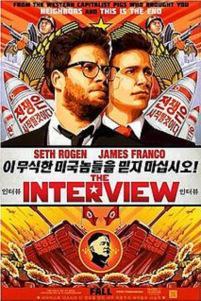Sony Pictures Entertainment has reversed its prior decision to pull the movie The Interview, an action comedy about two American journalists (played by Seth Rogen and James Franco) who wrangled an interview with North Korea’s ruthless savage dictator Kim Jong Un, then assassinated Kim.

Hackers who call themselves “Guardians of the Peace,” determined by federal investigators to be associated with the North Korea government, had hacked into Sony’s computers and leaked a trove of embarrassing emails. Then the hackers threatened to to carry out terrorist attacks against cinemas that screen The Interview, which originally was scheduled for release on December 25.
On Dec. 17, Sony buckled under pressure and took the unprecedented step of canceling the Dec. 25 release of the The Interview.
Obama and the F.B.I. accused North Korea of targeting Sony and pledged a “proportional response” just hours before North Korea’s Internet went dark without explanation.
But now Sony has reversed its decision.
The movie is being screened today in independent theaters across the United States. Beginning yesterday at 10 a.m. PT, the movie can also be downloaded from from Google Play, YouTube Movies, Xbox Video and the website SeetheInterview.com for $5.99, or $14.99 for an HD version.
Here’s a preview:
Sony’s reversal has led InfoWars to wonder if the whole thing is a marketing scam — “a cynical PR campaign from the start.”
Indeed, the New York Times reports:
A number of private security researchers are increasingly voicing doubts that the hack of Sony‘s computer systems was the work of North Korea…with some even likening the government’s claims to those of the Bush administration in the build-up to the Iraq war.
Fueling their suspicions is the fact that the [Obama] government based its findings, in large part, on evidence that it will not release, citing the ‘need to protect sensitive sources and methods.’ […]
“Essentially, we are being left in a position where we are expected to just take agency promises at face value,” Marc Rogers, a security researcher at CloudFlare, the mobile security company, wrote in a post Wednesday. “In the current climate, that is a big ask.”
Mr. Rogers, who doubles as the director of security operations for DefCon, an annual hacker convention, and others like Bruce Schneier, a prominent cryptographer and blogger, have been mining the meager evidence that has been publicly circulated, and argue that it is hardly conclusive.
For one, skeptics note that the few malware samples they have studied indicate the hackers routed their attack through computers all over the world. One of those computers, in Bolivia, had been used by the same group to hack targets in South Korea. But that computer, as well as others in Poland, Italy, Thailand, Singapore, Cyprus and the United States, were all freely available to anyone to use, which opens the list of suspects to anyone with an Internet connection and basic hacking skills.
For another, Sony’s attackers constructed their malware on computers configured with Korean language settings, but skeptics note that those settings could have been reset to deflect blame. They also note the attackers used commercial software wiping tools that could have been purchased by anyone.
They also point out that whoever attacked Sony had a keen understanding of its computer systems — the names of company servers and passwords were all hard-coded into the malware — suggesting the hackers were inside Sony before they launched their attack. Or it could even have been an inside job. […]
On Wednesday, one alternate theory emerged. Computational linguists at Taia Global, a cybersecurity consultancy, performed a linguistic analysis of the hackers’ online messages — which were all written in imperfect English — and concluded that based on translation errors and phrasing, the attackers are more likely to be Russian speakers than Korean speakers.
Such linguistic analysis is hardly foolproof. But the practice, known as stylometry, has been used to contest the authors behind some of history’s most disputed documents, from Shakespearean sonnets to the Federalist Papers.
[…] other private security researchers say their own research backs up the government’s claims. CrowdStrike, a California security firm that has been tracking the same group that attacked Sony since 2006, believes they are located in North Korea and have been hacking targets in South Korea for years.
But without more proof, skeptics are unlikely to simply demur to F.B.I. claims. “In the post-Watergate post-Snowden world, the USG can no longer simply say ‘trust us’,” Paul Rosenzweig, theDepartment of Homeland Security’s former deputy assistant secretary for policy, wrote on the Lawfare blog Wednesday. “Not with the U.S. public and not with other countries. Though the skepticism may not be warranted, it is real.”
In real life, Kim Jong Un, the obese grandson and son of North Korea’s previous dictators, Kim Il Sung and Kim Jong Il, lives a life of luxury and gluttony while his subjects starve to death. Kim the 3rd reportedly had his own uncle killed and fed to dogs.
See:
- North Korea’s Kim: Another socialist dictator with multimillions in assets
- North Koreans driven to cannibalism from famine and govt mismanagement
- North Korea’s leader Kim Jong Un had his uncle fed to 120 ravenous dogs
- North Korea Threatens US With Pre Emptive Nuke Strike. Oh Joy….
~Eowyn

